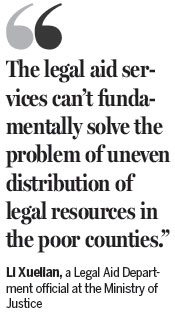Volunteer lawyers helping the poor
Updated: 2015-08-21 07:39
By Zhang Yan(China Daily)
|
|||||||||||
Program in 174 counties handled 10,000 cases last year, a year-on-year increase of 20 percent
Before Zhu Rui became a volunteer lawyer in Yining, Xinjiang Uygur autonomous region, in 2013, the small city in Northwest China had no licensed legal services.
Yining is not an isolated case. The vast central and western areas of China face a dire shortage of legal resources, according to the Ministry of Justice.
Previously, people charged with crimes who could not afford a lawyer had to turn to unqualified legal workers. And those whose civil cases were settled without proper legal aid later found themselves involved in drawn-out disputes and a series of petitions to higher officials.
So the ministry launched a legal aid volunteer project in 2009 called One Plus One, aiming to send at least one lawyer and a volunteer to each of the poorest counties in 13 provinces and regions in central and western areas.
To date, free legal aid has been extended for the poor and disadvantaged in 174 such counties, said Sun Jianying, director of the ministry's Legal Aid Department.
The legal aid program has helped "promote fairness and justice, which is related to the vital interests of residents as well as social harmony and stability", Sun said.
According to Hu Zhanshan, secretary-general of the China Legal Aid Foundation, 417 lawyers and more than 300 college students majoring in law have taken part in the project so far.
The foundation earmarks 20 million yuan ($3.23 million) each year in a special fund to guarantee the program runs smoothly.
"Most of the counties in the program are in Guizhou, Yunnan and Qinghai provinces, as well as autonomous regions such as Ningxia, Tibet and Xinjiang," Sun said.
According to the foundation, the lawyers and volunteers handled about 10,000 cases in the counties last year, involving 19,580 people, a year-on-year increase of 20 percent.
"Disadvantaged litigants, including the elderly, minors, the disabled and migrant workers, are those who need such services most," Sun said.
Zhu Rui, the sole lawyer in Yining, is the only help some people can turn to.
She was assigned to provide legal services to a married couple who were charged with using their membership of a cult to undermine law enforcement.
The couple, from a village near Yining, joined a cult called the Church of Almighty God in 2010. They persuaded others to join by showing videos they had produced of "police officers" torturing suspects. The couple assured people the cult would protect them from such violent acts.
After they were detained by police in Yining in October last year, they had no money to hire a lawyer. Zhu represented the couple who, in July, were both sentenced to four years in prison.
The couple's two daughters had no relatives to look after them, so Zhu organized payment for the girls' tuition fees - one for high school and the other for college - and arranged accommodations for them in Yining.
Yang Yanping, director of the China Legal Aid Foundation's project management office, said that the poor counties urgently needed professional legal services, because "if the small conflicts and disputes aren't solved in a timely manner, they will lead to some petition cases or even mass incidents".
Living conditions
China's uneven allocation of legal resources is illustrated by the fact that only 7,000 of the country's 270,000 lawyers work in the underdeveloped central and western regions, according to the Ministry of Justice.
"The legal aid services can't fundamentally solve the problem of uneven distribution of legal resources in the poor counties," said Li Xue - lian, a senior Legal Aid Department official at the Ministry of Justice.
Li believes that the key is to "speed up economic development in less well-off areas, then bring in and cultivate more legal professionals".
She called for more financial support from the government and private donations to expand the scale of legal aid and improve working standards and living conditions for the volunteers.
Volunteer lawyers receive only 3,500 yuan a month on average. If they work in harsh conditions, such as the high altitude in the Xinjiang Uygur or Tibet autonomous regions, they receive an additional one-off payment of 20,000 yuan.
Ma Lan, a lawyer at Gaotong Law Firm in Beijing, went last year to Xingyi county in Guizhou province. She has handled more than 600 legal aid cases in the past six years.
"It's equally important to tutor and train local legal volunteers, who will accumulate more practical experience in handling cases," she said.
zhangyan1@chinadaily.com.cn
|
Liu Song (third from left), a lawyer in Hubei province, talks to residents in Wangmo county, Guizhou province, while working for the legal aid volunteer project One Plus One, which was launched by the Ministry of Justice. Provided to China Daily |


(China Daily 08/21/2015 page5)
Today's Top News
No cyanide detected from Tianjin river section with fish deaths
Greek PM to resign, seek snap election in September
Britain to reopen embassy in Tehran this weekend
Chemical plants to be relocated in blast zone
IMF to extend current SDR basket until September 2016
China-Russia joint military drill no reason for concern
Rebels in Ukraine's Donetsk plan referendum on joining Russia: media
Man in yellow shirt is Bangkok bomber: Police
Hot Topics
Lunar probe , China growth forecasts, Emission rules get tougher, China seen through 'colored lens', International board,
Editor's Picks

|

|

|

|

|

|







